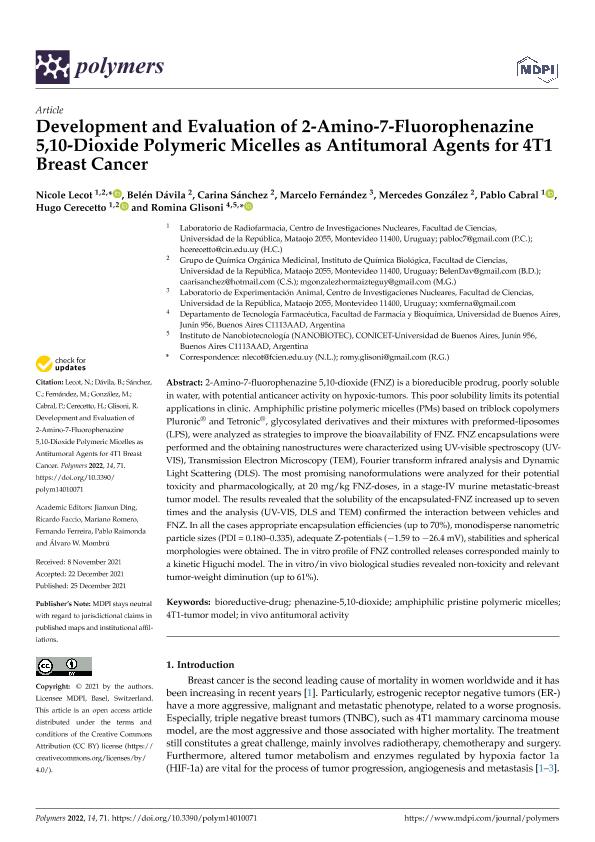Mostrar el registro sencillo del ítem
dc.contributor.author
Lecot, Nicole
dc.contributor.author
Dávila Belzunce, María Belén

dc.contributor.author
Sánchez, Carina
dc.contributor.author
Fernández, Marcelo
dc.contributor.author
González, Mercedes
dc.contributor.author
Cabral, Pablo
dc.contributor.author
Cerecetto, Hugo
dc.contributor.author
Glisoni, Romina Julieta

dc.date.available
2022-09-27T13:31:24Z
dc.date.issued
2021-01
dc.identifier.citation
Lecot, Nicole; Dávila Belzunce, María Belén; Sánchez, Carina; Fernández, Marcelo; González, Mercedes; et al.; Development and Evaluation of 2-Amino-7-Fluorophenazine 5,10-Dioxide Polymeric Micelles as Antitumoral Agents for 4T1 Breast Cancer; MDPI; Polymers; 14; 1; 1-2021; 1-14
dc.identifier.issn
2073-4360
dc.identifier.uri
http://hdl.handle.net/11336/170609
dc.description.abstract
2-Amino-7-fluorophenazine 5,10-dioxide (FNZ) is a bioreducible prodrug, poorly soluble in water, with potential anticancer activity on hypoxic-tumors. This poor solubility limits its potential applications in clinic. Amphiphilic pristine polymeric micelles (PMs) based on triblock copolymers Pluronic® and Tetronic®, glycosylated derivatives and their mixtures with preformed-liposomes (LPS), were analyzed as strategies to improve the bioavailability of FNZ. FNZ encapsulations were performed and the obtaining nanostructures were characterized using UV-visible spectroscopy (UV- VIS), Transmission Electron Microscopy (TEM), Fourier transform infrared analysis and Dynamic Light Scattering (DLS). The most promising nanoformulations were analyzed for their potential toxicity and pharmacologically, at 20 mg/kg FNZ-doses, in a stage-IV murine metastatic-breast tumor model. The results revealed that the solubility of the encapsulated-FNZ increased up to seven times and the analysis (UV-VIS, DLS and TEM) confirmed the interaction between vehicles and FNZ. In all the cases appropriate encapsulation efficiencies (up to 70%), monodisperse nanometric particle sizes (PDI = 0.180–0.335), adequate Z-potentials (-1.59 to -26.4 mV), stabilities and spherical morphologies were obtained. The in vitro profile of FNZ controlled releases corresponded mainly to a kinetic Higuchi model. The in vitro/in vivo biological studies revealed non-toxicity and relevant tumor-weight diminution (up to 61%).
dc.format
application/pdf
dc.language.iso
eng
dc.publisher
MDPI
dc.rights
info:eu-repo/semantics/openAccess
dc.rights.uri
https://creativecommons.org/licenses/by/2.5/ar/
dc.subject
10-DIOXIDE
dc.subject
4T1-TUMOR MODEL
dc.subject
AMPHIPHILIC PRISTINE POLYMERIC MICELLES
dc.subject
BIOREDUCTIVE-DRUG
dc.subject
IN VIVO ANTITUMORAL ACTIVITY
dc.subject
PHENAZINE-5
dc.subject.classification
Nano-materiales

dc.subject.classification
Nanotecnología

dc.subject.classification
INGENIERÍAS Y TECNOLOGÍAS

dc.title
Development and Evaluation of 2-Amino-7-Fluorophenazine 5,10-Dioxide Polymeric Micelles as Antitumoral Agents for 4T1 Breast Cancer
dc.type
info:eu-repo/semantics/article
dc.type
info:ar-repo/semantics/artículo
dc.type
info:eu-repo/semantics/publishedVersion
dc.date.updated
2022-09-13T11:05:32Z
dc.journal.volume
14
dc.journal.number
1
dc.journal.pagination
1-14
dc.journal.pais
Suiza

dc.journal.ciudad
Basel
dc.description.fil
Fil: Lecot, Nicole. Universidad de la República; Uruguay
dc.description.fil
Fil: Dávila Belzunce, María Belén. Universidad de la República; Uruguay
dc.description.fil
Fil: Sánchez, Carina. Universidad de la República; Uruguay
dc.description.fil
Fil: Fernández, Marcelo. Universidad de la República; Uruguay
dc.description.fil
Fil: González, Mercedes. Universidad de la República; Uruguay
dc.description.fil
Fil: Cabral, Pablo. Universidad de la República; Uruguay
dc.description.fil
Fil: Cerecetto, Hugo. Universidad de la República; Uruguay
dc.description.fil
Fil: Glisoni, Romina Julieta. Consejo Nacional de Investigaciones Científicas y Técnicas. Oficina de Coordinación Administrativa Houssay. Instituto de Nanobiotecnología. Universidad de Buenos Aires. Facultad de Farmacia y Bioquímica. Instituto de Nanobiotecnología; Argentina
dc.journal.title
Polymers
dc.relation.alternativeid
info:eu-repo/semantics/altIdentifier/url/https://www.mdpi.com/2073-4360/14/1/71
dc.relation.alternativeid
info:eu-repo/semantics/altIdentifier/doi/http://dx.doi.org/10.3390/polym14010071
Archivos asociados
